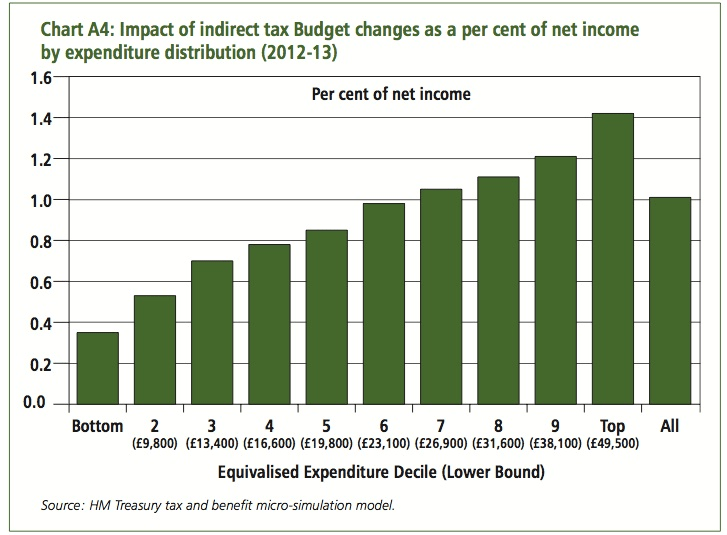This is a slow-burning budget. Not because Osborne has concealed, like Gordon Brown did, but because the reverse is true. The budget is, as Osborne says, a third of the size but with three times the amount of information. It has layers: some policies and language are there just to assuage the LibDems. Some are pure Tory. James has a brilliant cover piece in tomorrow’s magazine which spells out the political, rather than economic, forces at work in this budget. Osborne, that great player of three-dimensional chess, sees in this budget plans to restore a Tory majority government. The Red Book itself is, for wonks like myself, a joy to read: straight figures, with nothing concealed. The IFS can take credit for this: Osborne’s greater transparency comes because he knows that it’s futile to hide anything. Robert Chote or Gemma Tetlow will sniff it out. But for now, the following questions are mulling in my mind…
1) This budget marks the end, not the beginning, of ideologically-driven fiscal policy. The Spectator says in its leader tomorrow that the last decade – where state spending increased more than any other country in any other postwar decade – was the era of ideology. The last decade tested to destruction the notion that society would somehow become fairer and more prosperous if the state massively expanded. This Osborne budget is a return to rationalism. More about this in the mag tomorrow.
2) It’s easy to pencil in welfare savings, as Osborne has done, but IDS’ welfare reform is more likely to cost money than save it. As Wisconsin shows, this is about saving lives more than money: IDS bills the DWP as the no1 poverty fighting department. In my view, the billions “spent on child poverty” (ie, manipulating a spreadsheet that purports to show child poverty) should be spent on the DWP so it can combat real poverty and through work, not handouts.
3) Osborne will come to regret his NHS pledge. This is what has magnified a 5% cut in budgets into a 25% cut on affected areas. If “we’re all in this together” why is the vast NHS bureaucracy not affected? This is when the real political pain will come. How can we cut the military at a time of war whilst vastly expanding overseas aid? Osborne’s cuts are no more, or less, than was expected. He could have gone further, but the LibDems wanted their tax credit payouts and raising the tax threshold.
4) This is not a “figleaf” concession to the LibDems – it’s a genuine coalition budget. A pure Tory one would have looked different. Obviously I’d have preferred a pure Tory one, but Osborne was genuine and generous in the concessions made to Clegg – who deserved the ovation he receved when meeting LibDem MPs last night.
5) What is Polly Toynbee complaining about? She called the other day for an Office for Fairness, to guarantee the distributional impacts of the cuts. Osborne devoted a page to it in his budget. Now, I loathe this agenda – instead of fighting poverty, it seeks to manipulate spreadsheets. It continues the failed Labour policy which considers welfare, not work, the best way of fighting poverty. It blinkered policymakers, and saw an insane system where almost all of the new jobs created were filled by immigrants. It broke the link between economic expansion and the dole queue. But Chart A4 on p68 of the budget (below) is the graph of Toybee’s dreams. It attributes to these blunt tax and spend measures an impossible degree of accuracy. It takes us back to the vices of the Brown era, where welfare policy was intended to manipulate such a graph – not fight poverty. The agenda, alas, continues – and Polly should see this as a substantial triumph.
6) Osborne’s cuts are not 80/20 like he claimed. After all that fuss, there’s bugger all difference between the two parties over this. The below graph from Citibank shows that the fiscal tightening Osborne inherited were, on average, 63% cuts and 47% spending. Add his new fiscal tightening at the ratio nudges up to 65/35. It’s only 80/20 if you look at the new cuts, in the last year.
Pete will be at the IFS briefing, so I’ll leave the rest of the fiscal analysis to the pros. A new fiscal strategy was born yesterday, with many layers and objectives. It is, I think, the launchpad of a counter-revolution – of reversing the ideologically-driven power grab of the last ten years. Osborne’s budget is a complex document, whose direction will become more clear as he elaborates on its different parts. But it is lacking in neither boldness or direction. We are, at last, on the road to recovery.









Comments